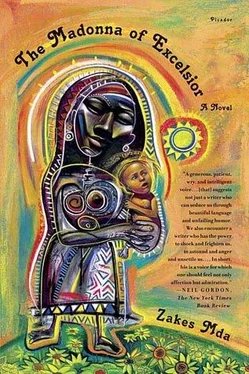“We fear that even in your Johannesburg, people will see us as the bad women of Excelsior,” added Susanna.
We jeered and cheered. The women were both heroes and villains to various sections of the crowd.
We mocked Maria: “Hello, Mrs Lombard.”
We taunted Mmampe: “Hello, Mrs Smit.”
We leered at Niki: “Hello, Mrs Cronje.”
We called each one of the women by the name of the lover with whom she had been charged. Sometimes a section of the crowd would name the wrong man for a particular woman. Another section of the crowd would proffer a correction. Then an argument would ensue among the various members of the crowd as to who the right partner for the woman really was.
We cheered and jeered even louder when Johannes Smit and Groot-Jan Lombard emerged from the courtroom. They tried to skulk away to their cars in the parking lot. But they could not escape the vigilant reporters. The men did not stop to be interviewed. They answered the questions as they walked on, with the reporters following them like hunting dogs on a chase. Except for the fact that the quarry was not running. Groot-Jan Lombard was too old and tired to run. And Johannes walked close beside him in solidarity.
“Mr Lombard,” shouted one hack, “how do you feel?”
“Very good!” responded Groot-Jan Lombard, doddering on.
‘And how do you feel about the Immorality Act?”
“I must speak as a party man,” said Groot-Jan Lombard. “My party introduced the laws. People who commit immorality should be prosecuted.”
“Yes,” added Johannes Smit, “if someone is caught in the act of committing immorality, there is a good reason for prosecuting him. What sticks in the gullet is that allegations are often made against innocent people, who then have to suffer.”
More people in the street joined the song and dance. Out-of-towners from the farms who had no idea what the celebration was about, and did not care. A song is a song, and a dance is a dance.
Niki — with Popi strapped in a shawl on her back — did not participate in all this jubilation. She was exhausted and just wanted to get away to the quietness of her shack. Maybe Pule would be there, waiting for her. Freedom planted daydreams in her head. Pule. He was becoming a fading memory. And Viliki. She had to see Viliki. She had missed him for almost a month. She had missed Pule, too. But that, she had convinced herself, was a hopeless longing that might never be fulfilled. Viliki was now the only man in her life. Unless Pule showed through his actions that he really meant it when he had claimed before her arrest that he forgave her because only God could judge. Viliki. She knew that he was all right. Mmampe’s mother, who had never missed a day in court, reported that he was fine. He had eventually stopped asking after her. They had told him that his mother had gone to Lesotho to buy “nice things” for him.
The reporters were not prepared to let Niki escape. Cameras flashed. She hid her face behind a newspaper that she rolled in conical Basotho-hat style. But the pests were not prepared to give up. They seemed to be more interested in her than in the other women. Perhaps because her partner had committed suicide as a result of the trial. She was more newsworthy. She ran for refuge to a toilet behind the courtroom. Surely no self-respecting reporter would pursue her into the female toilet — and a racially segregated toilet at that!
RUMOURS OF WAR followed the discharge of the women. We heard of white people who were fighting amongst themselves in Cape Town. Hurling words of anger at one another in their Parliament. Scuttling around in damage control efforts at the Union Buildings in Pretoria. All because of the black women of little Excelsior, so far away. We bought newspapers every day. Die Volksblad. The Friend . We ravished every page that had anything to do with immorality and miscegenation. Each issue circulated from one homestead to the next. Until it was tattered. Until smokers used the pieces to roll their zols of tobacco or dagga.
The sins of our mothers had caused wonderful upheavals in the land.
The Friend , 3 February 1971:
The Minister of Justice, Mr P.C. Pelser, said in the Assembly yesterday that as long as he was Minister of Justice and as long as the Nationalist Party governed the country, the Immorality Act would not be “scrapped”.
He also said that the reason why the police had acted in the Free State town of Excelsior was because Whites and non-Whites had complained that there were too many half-caste children walking the streets.
The consequences of the implementation of section 16 of the Act were actually as a result of the abhorrence which the people felt against miscegenation.
Earlier yesterday Mr M.L. Mitchell (U.P. Durban North) had asked him during question time whether he had given any instructions in connection with the withdrawal of the case against the accused at Excelsior. His reply had been that he had definitely not done so.
Before he had formally withdrawn the case, the Attorney-General, Dr Percy Yutar, had telephoned him and had informed him that he was not going to proceed with the case. Dr Yutar had done this to prevent him (the Minister) from first reading about the decision in the newspapers or hearing about it over the radio.
The Friend , 10 February 1971:
The Coloured population of the Free State village of Excelsior has more than doubled over the past 10 years.
Excelsior received worldwide publicity because of a series of Immorality Act trials and because of the fact that the charges against 19 accused were withdrawn by the State at the last minute last month.
Preliminary 1970 census statistics show that the 273 Coloureds enumerated in the 1960 census had increased to 580–299 women and 281 men — by 1970.
The number of Whites, however, decreased from 2,800 to 2,470—a total of 1,322 men and 1,148 women — while the number of Africans increased from 19,898 to 23,594—10,908 men and 12,686 women.
The Friend , 16 February 1971:
The Minister of Justice, Mr P.C. Pelser, said in reply to a question in the Assembly yesterday by Mrs H. Suzman (P.P. Houghton) that the first indication that witnesses in the immorality case in Excelsior were unwilling to give evidence, came on 21 January.
Asked by Mrs Suzman whether any of the police witnesses were found by the Attorney-General to be unwilling to give evidence, the Minister said: “No.”
Asked whether any of the other witnesses were found by the Attorney-General to be unwilling to give evidence, the Minister replied: “Yes.”
The Friend , 18 February 1971:
The Friend was criticised in the Free State Provincial Council yesterday afternoon for publishing a report last week that the Coloured population in the Free State village of Excelsior had more than doubled over the past 10 years.
“Why did The Friend specifically mention Excelsior only?” Mr P.W. Nel (Winburg) asked.
“The newspaper could also have noted increases in the Coloured population of towns like Boshof, Jagersfontein, Harri-smith, Philippolis and Welkom.”
The Friend , 28 February 1971:
The Attorney-General of the Free State, Dr Percy Yutar, said yesterday that he was aware that prosecution witnesses in the Excelsior immorality trials could have been compelled to give evidence or face imprisonment.
Dr Yutar was commenting on the widespread puzzlement at the reasons for withdrawing the charges against the 19 people, five White men and 14 African women, who were accused of contravening the Immorality Act.
It was announced that charges were withdrawn because prosecution witnesses were not willing to give evidence.
In an interview yesterday, Dr Yutar said that he was “aware of section 212 of the Criminal Procedures Act” which empowers magistrates and judges to imprison witnesses who refuse to give evidence.
Читать дальше












